Indonesia is an incredible place to visit and, in our opinion, much more rewarding and full of potential than some of the other more tourist-worn parts of Southeast Asia.
And the fact that it doesn’t get as many tourists means that not following certain cultural (and facility) norms will be more shocking to locals. You could end up inadvertently being the ‘bad foreigner.’ Or the confused foreigner who messes up the plumbing in the hotel, or the sad foreigner whose camera equipment gets water damage in the extreme humidity!
Note that the following list is more about the “less explored” (by foreign tourists) parts of Indonesia and excludes the very popular Bali, where tourism is obviously huge!
There are also certain items you should have on your Indonesia packing list that maybe aren’t common knowledge, especially if you’ve never visited such a rich, humid, biodiverse country. Here is the quick list of THINGS TO KNOW BEFORE YOU GO, explanations to follow:
- Learn how to flush an Indonesian toilet and use a squatty potty
- Learn how to wash in an Indonesian bathroom (called a “mandi”)
- You will experience what it’s like to be famous (“Mister, picture, picture!”)
- Like every country, Indonesia also has race issues
- Be aware of the significant role of RELIGION in Indonesia
- Unmarried couples and single people, prepare yourselves for questions
- You’re going to need medicated talcum powder…
- If you’re planning on hiking in the jungle, leave your expensive boots at home
- It may be trickier but vegetarians and vegans can get by well in Indonesia!
- There is a dress code for men and women, tourists included
- Beach wear etiquette is important
- You should learn at least a little bit of Bahasa Indonesia (language) before you go
- Alcohol is not readily available in many places
- Always remember to take your shoes off
- HUMIDITY and your electronics don’t mix
- You can buy cheap medication and toiletries when you get there
- You can get a 30-day SIM card for your phone as a tourist – to never be without INTERNET!
- Don’t drink the water
- The outlet plugs are EUROPEAN style
- You can get a free 30-day visa on arrival (for citizens of 160 countries)
- Avoid using your left hand! Sorry, lefties
- Couples – Avoid PDA!
- Hydration is serious business
- Get the required vaccinations and medications before leaving home
- Buy the travel insurance!
This essential knowledge will make your trip to wonderful, beautiful Indonesia much more enjoyable!
#1 – Learn how to use an Indonesian toilet and squatty potty
In rural areas and in budget hotels, you will most likely come across Indonesia toilets that look like this:
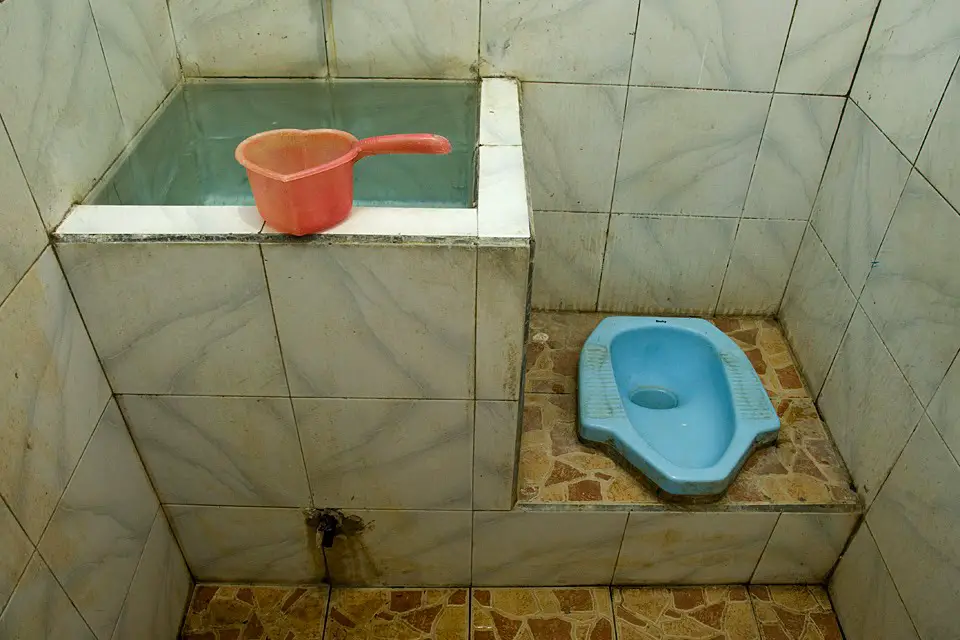
And if you’re not prepared, you may find yourself very confused!
Using a squatty potty – In Indonesia, you may have a “regular” western toilet situation or more commonly, a squatty potty, just like in much of Asia.
If you’re not sure how to use a squatty: You plant your feet on either side of the hole (the dirty, grooved platforms where many other feet have likely been!), squat down, and go! Aim for the water! FYI, if you’re wearing a dress or a sarong, this process is much easier.
You may come to prefer squatties because you don’t have to make skin-to-toilet-seat contact with a dirty toilet. It seems more hygienic, doesn’t it?
A lot of Indonesians prefer squatties too, and have a hard time adjusting to western toilets when they go abroad, like my friend’s dad who felt really constipated after using western toilets and reverted to squatting over the western toilet. That must be why there are signs like this in many Asian toilet stalls that have western toilets:
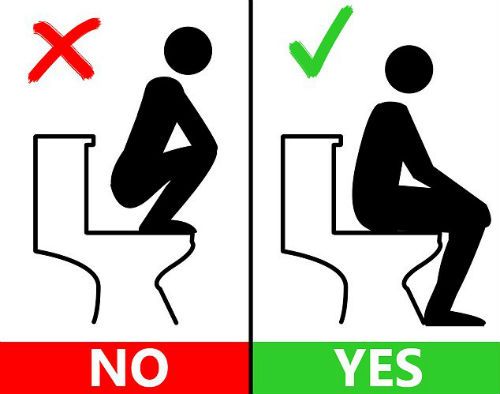
Flushing – In Indonesia, you often won’t find a working automatic flush on either squatty potties or western-style toilets. Instead, you’ll see a plastic scooper floating in an open tank of water, or a bucket of water, next to the toilet/squatty hole.
Take a scoop of water from the tank or bucket and simply pour it into the toilet/squatty hole after you’re finished pooping/peeing! One or two scoops should do it. Maybe a few more if it’s #2. And voila, the toilet is flushed.
If the bucket or tank runs out of water, there’s usually a little spout you can turn on to refill it.
Wiping – For wiping, there will be NO TOILET PAPER (usually) because Indonesians use the water scooper to wash off. And then give a little shake, and carry on—it’s hot, so things dry quickly in Indonesia. If you want toilet paper, bring it with you and carry it around in your bag.
Don’t put toilet paper in the toilet! You’ll clog it. Instead, there’s usually a trash can or bag for disposing of paper next to the toilet that you can use.
Hand washing – There may or may not be hand washing available in public bathrooms. Carry around a travel-sized bottle of hand sanitizer with you for just such occasions!
#2 – Learn how to wash in an Indonesian bathroom (a “mandi”)
Washing and bathing in Indonesia can be confusing for some travelers. In rural and budget hotels, that same tank of water that you used to flush is what you use to wash yourself, or “take a mandi.” But whatever you do, DON’T CLIMB INSIDE IT. Some people think it’s a bathtub but it’s not. Big Indonesia-traveler rookie mistake!
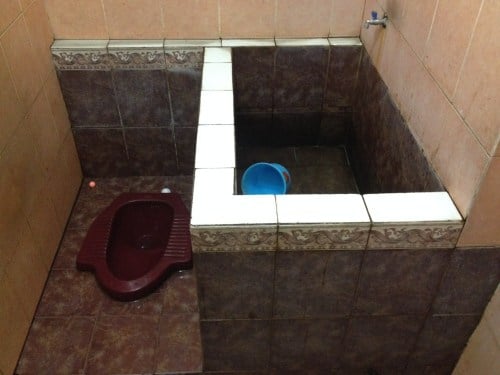
To bathe, take that plastic scooper, scoop up water from the tank or bucket, and pour it on yourself! Repeat until satisfied! You can splash water everywhere, soaking everything in the bathroom. It’s okay, and really fun. In the hot, humid climate, you might want to take several mandis a day!
Fancier hotels and bigger cities will have western-style showers. But that’s no fun.
#3 – You will experience what it’s like to be famous (“Mister, picture, picture!”)
If you’ve ever wondered what it feels like to be a celebrity, visit a rural part of Indonesia as a foreigner. Not even—in bigger cities, this happens as well. You’re walking down the street and someone will lean out of a car to yell, “HELLO MISTER!” even if you’re a woman. You’ll get a hundred Hello, Mister! yells a day. “BULE!” (meaning “foreigner”) is another term that will be yelled in your direction.
People will also ask to take pictures with you. Or not ask, and just take sneaky pictures of you! This is kind of fun at first, but might become a bit tiresome. And you may start to feel like an object or a zoo animal. You can always politely smile and decline. And you might even feel a kernel of empathy for Hollywood stars!
#4 – Like every country, Indonesia also has race issues
Nowhere is immune! In Indonesia, you’ll find people avoiding the sun to maintain a lighter skin tone, skin whitening products everywhere, and paler actors and actresses on TV that don’t seem to reflect the many darker real-life Indonesians. This black woman’s experiences living in Indonesia from The Atlantic offers greater insight.
In touristy Raja Ampat in West Papua, people tend to be darker and there is historical tension between them and the rest of Indonesia. Keep in mind that depending on your own racial identity and where in Indonesia you go, you may experience the country differently.
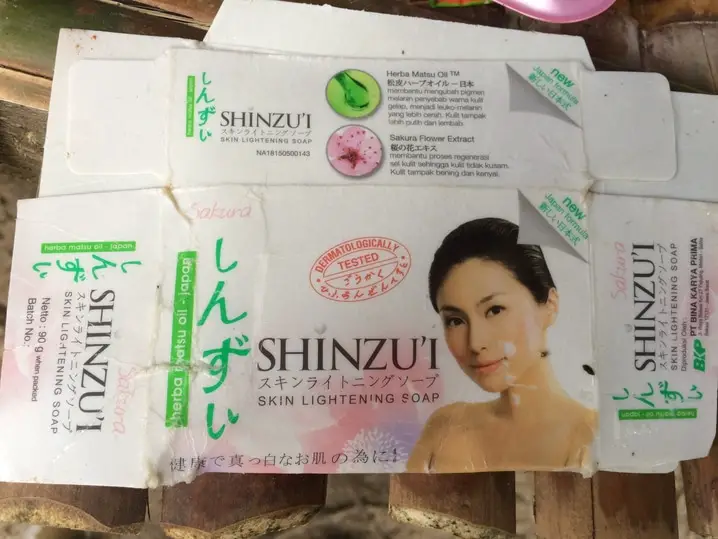
A package of skin lightening soap sold in Indonesia
#5 – Be aware of the role of RELIGION in Indonesia
In Indonesia, religion plays a significant role in much of daily life. The government requires all citizens to have an identification card and, on this card, citizens are to identify which of the 6 recognized religions they belong to. Apparently, they can choose to leave it blank if they’d like, but almost no one does this. In 2010, the numbers for religion in Indonesia looked like this:
Recognized Religions in Indonesia
- Islam (87.2%)
- Protestant Christianity (7%)
- Catholic Christianity (2.9%)
- Hinduism (1.7%)
- Buddhism (0.7%)
- Confucianism (0.05%)
- Other religions/no answer (0.45%)
Agnosticism and atheism aren’t recognized in Indonesia. We stayed mostly in a Muslim-majority area of Indonesia (Buton Island in Sulawesi) but even on this tiny island, there were Hindu villages as well. Indonesians are very diverse! But mostly tolerant of each other’s religions.
Religious practices will vary greatly depending where you go. And you should be aware that people will be curious about your religion and will ask you questions about your own religious beliefs.
#6 – Unmarried couples and single people, prepare yourselves for questions
We talked about this before in another article—People in Indonesia will be curious and not afraid to be indiscreet regarding your personal life! If you’re a solo female traveler, you will receive endless inquiries about your marital status and questions about whether or not you have children, and if you don’t—why not?!
Couples – Depending on where you go in Indonesia, some people may be shocked to learn that you’re unmarried and you may receive many questions—why not? Why don’t you have children? This line of questioning may seem intrusive but it’s just normal in Indonesia! Be ready 🙂
Couples may be assumed to be married. Just go with this, as married couples are better respected in Indonesia, and unmarried couples traveling together just doesn’t translate well into conservative cultures of Indonesia. Make it easy on yourselves! Congratulations, you’re married!
7. You’re going to need medicated talcum powder…
Indonesia is so hot and humid and due to the conservative culture, you’ll be covering up more than you usually would in this kind of climate. Even though you should choose to wear lightweight breathable cotton, you still might experience some sweaty chafing! Lovely!
You will also be walking a lot, and if you plan on hiking in the jungle, you can VERY QUICKLY develop fungus (athlete’s foot) or trench foot (which is bacterial) –both are horrendous, itchy, painful, and will ruin any saltwater beach adventures you have planned. We saw this happen to many of our volunteers in Sulawesi who did not take care of their feet!
To combat this, make sure you have some medicated talcum powder with you. Every day, spend some time letting your feet BREATHE and cover them with talcum powder—get between the toes! The very best powder for this is Herocyn medicated powder which you can get on Amazon.
Or search for in the Indonesia pharmacies for (usually) much cheaper. The unmedicated stuff is not good enough!

#8 – If you’re planning on hiking in the jungle, leave your boots at home
This leads to a point on shoes and hiking! We were leading long expeditions into the Indonesian rainforest—hours of walking through mud and trying to spot cool wildlife. If this is something on your bucket list for Indonesia, you may be thinking of bringing big, heavy expensive hiking boots with you.
In our experience, even the most badass waterproof hiking boots from back home are no match for the rainforest. The mud encases them, making them super heavy and tiresome to walk in. The soles often rip off as well, under the constant, suctioning pressure of sticky mud.
An alternative is to go to a local shop upon arrival in Indonesia and ask around for “zapatos kampung” also called zapatos puti. These are lightweight cleat-like shoes worn by the locals in the jungle. They are pretty much a single piece of rubber with rubber spikes on the bottom, and once you try them—you will ditch your expensive hiking boots in a second! And they only cost about 5 US dollars!

The only thing to keep in mind is shoe size—if you have big feet (US size 11 men’s or higher), you might have trouble finding your size in Indonesia.
Wellies or rubber boots can also be a good option, but if you’re not used to walking in them, they can give you some pretty nasty blisters.
We haven’t hiked the mountains in Indonesia yet, in which case those expensive hiking boots might come in handy!
#9 – It may be trickier sometimes but vegetarians and vegans can get by well in Indonesia!
Vegetarians and vegans in Indonesia can get by well enough—you just may have limited options sometimes and may encounter some confused faces at restaurants. Again, Bali is excluded from this list! Bali has many plant-based options. Also big cities like Jakarta seem to have many vegetarian and vegan options.
In some other parts of Indonesia, it’s common to find dishes with meat (such as in Sulawesi, where we mostly were). We ate a lot of chicken and fish. But vegetarian and vegan options were plentiful as well. Indonesian dishes include rice, noodles, eggs, tempeh, tofu, vegetables, and more! Don’t let a specific diet discourage you from visiting Indonesia.
#10 – There is an unofficial dress code for men and women, tourists included
Indonesia is a conservative culture and it’s important to dress appropriately for the surroundings. Observe what the locals are wearing and try your best to follow suit.
This will mean, for men and women, avoiding wearing anything that shows your bare shoulders, stomach, and legs above the knee. Head scarves don’t have to be worn.
For more detailed information about clothes, check out our post What to Wear in Raja Ampat, Indonesia to Avoid Offending People 🙂
#11 – Beach wear etiquette is important
If you’re planning to visit the beaches in Indonesia or go diving, it’s good to do a bit of research on the specific area or island that you’ll be visiting before you go.
In touristy parts of Indonesia such as Bali or Raja Ampat, it’s fine to wear bikinis on the beach. However, in some more conservative parts of Indonesia, bikinis on the beach would be quite shocking to local people. Women will be covered up completely on the beach and while swimming. Do a bit of research first.
No matter where you are in Indonesia, skinny dipping and topless sun bathing will not be appreciated and might even get you in trouble.
Finally, walking around towns and villages in bikinis isn’t appreciated in Indonesia. When going into town, cover up with a sarong or a dress.
#12 – You should learn at least a little bit of Bahasa Indonesia (language) before you go
Because there isn’t a ton of tourism in Indonesia compared to say, Thailand, many Indonesians don’t speak English and learning a bit of Bahasa Indonesia (the common language – there are literally hundreds of local languages!) will go a long way toward making your trip more fun.
It helps that it’s a relatively easy language to learn and that it utilizes the roman alphabet, just like English. Pronunciation is pretty much how it’s spelled.
Especially useful things to learn: greetings (hello, good morning, good afternoon, good evening- and don’t mix them up!), numbers – good for all money transactions, and polite niceties (Thank you! Sorry! Excuse me!).
#13 – Alcohol is not readily available in many places
In Bali and Raja Ampat, there is easy access to alcohol. Jakarta seems to have a bar and club scene. In Sulawesi, getting a hold of beer could sometimes feel like a secret mission. Drinking in public or public drunkenness is extremely frowned upon in Indonesia and you’re not going to find bars and clubs in many conservative areas—which perhaps keeps the party-er backpacking crowd away.
There are some locally brewed spirits that have reportedly killed people in the past! So, maybe avoid home-brews in Indonesia…
#14 – Always remember to take your shoes off
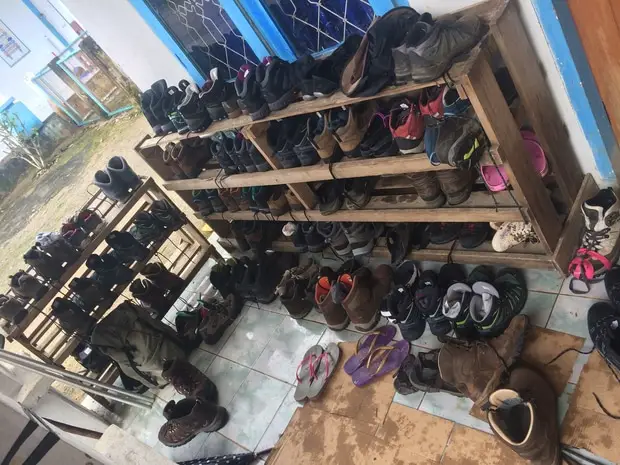
Of course, this is true of most Asian countries.
Whenever visiting someone’s home in Indonesia, even in small rural areas, it’s important to remove your shoes before entering someone’s home. Sometimes this is also expected in public areas, such as community centers or small family-owned shops.
In Sulawesi, where we were working with an environmental organization, we led foreign volunteers and high school students into the homes of local people in a very small village. Often, the students didn’t think to remove their shoes because it was a rural area—the floors of the homes were made of simple wooden boards and to the students, there didn’t seem to be a need to remove their shoes on such a surface. They would accidentally walk into the homes with their boots on. They had to readjust their thinking and become used to removing their shoes under the roof of someone’s home.
This shows the importance of closely observing what the local people are doing and trying to emulate their practices, in order to be respectful guests.
#15 – Humidity and your electronics don’t mix
You’ll definitely be traveling in Indonesia with your cameras, phones, and maybe your lap tops, tablets, and Kindles. It’s important to remember that Indonesia is incredibly humid. To the point where you won’t need skin moisturizer and all of your notebooks and paper money will be FLOPPY. Just from the moisture in the air.
So what does this kind of humidity do to your electronics?
There were many, many electronic casualties in our Sulawesi expeditions, even for people who were only visiting the jungle for one week. In the cities and villages, the humidity won’t be as much of an issue.
However, you’ll still face the possibility of heavy tropical rainfall and water splashing up on boat rides when you’re exploring the islands. It’s a good idea to take precautions to protect your expensive equipment.
To make your electronics last throughout your stay in Indonesia, make sure to:
- have individual waterproof cases for all of them
- never leave them outside of their cases for longer than you need to
- For phones, we bought these cases on Amazon
- KEEP SILICA GEL PACKETS (link to Amazon) in every case where you keep electronics, to absorb the moisture from the air!!
If your devices start acting strange, turn them off immediately, put them in a bag of dry rice for at least 48 hours (don’t turn them on!), and THEN retry them.
#16 – You can buy cheap medication and toiletries when you get there
Many travelers buy medications for their first aid kit before leaving for Indonesia. They load up and weigh down their bags with expensive meds and toiletries.
But you can actually buy most things WAY CHEAPER at Indonesian pharmacies. If you can wait until you arrive and then search for a pharmacy (there are a million), you’ll find these items for a fraction of the price.
Items such as paracetamol, diarrhea and constipation pills, band aids, talcum powder, soap, shampoo and conditioner, seasickness tablets, ear plugs, wipes, tissue paper, and mosquito repellent can be found in Indonesian pharmacies.
#17 – You can get a 30-day SIM card as a tourist in Indonesia
You can use your phone in Indonesia without paying crazy roaming prices with your cell phone provider in your home country. It’s also nice to have data on your phone and not be reliant on hotel wifi.
Before you leave home, make sure that your phone is UNLOCKED. Without an unlocked phone, replacing the SIM card won’t work. The easiest way to check if your phone is unlocked, and to unlock it is to call your cell phone provider or visit their store, and ask them to unlock it. Some providers will do this for free and others will charge you. You could also take it to a cell phone repair place and ask them to unlock it, and they’ll also do it for a fee.
When you arrive at the airport in Indonesia, visit one of the many phone kiosks or shops and ask for a pre-paid SIM card. Specify that you would like pre-loaded data and that you would like to be able to use it in many places in Indonesia (not just locally – some cards offer a large amount of data cheaply that can only be used locally).
Telkomsel is the provider we used and it had good coverage everywhere, even in remote islands in Raja Ampat. These cards won’t cost you much more than $15-20 USD and you can get however many gigabits of data you think you’ll use.

Now, the tricky part is that you have to register your phone number at a government office, with your passport, in order for your SIM to work! This is a new regulation as of May, 2018. You can do it like we did: take a taxi or motorbike ride to a nearby Telkomsel gerai or GraPARI office and spend a couple of hours waiting in line, before finally having your card registered. OR it seems that there are now offices available to tourists right in the major airports, like Jakarta, making the process much simpler.
This may seem like a huge pain in the ass, but it’s all part of the experience, right? And having that Indonesian SIM and data will make the rest of your trip much easier. You can top up on credit, or pulsa, in any little shop in Indonesia.
#18 – Don’t drink the water
The water isn’t safe to drink, so make sure you’re only drinking boiled or bottled water.
If you’re trying to reduce your “plastic footprint” (as we all should!) there are several options for water filtration or purification that you can bring with you to Indonesia and that are available on Amazon, including: water bottles with built-in filtration systems; life straws that filter the water as you drink it; and water purification droplets (which is what Phil usually uses).
And remember to only brush your teeth with boiled, purified, or bottled water too!
#19 – The outlet plugs are European-style

If you’re coming from another part of the world, you can either bring an adapter/converter with you from Amazon, or you can look for one in a market or convenience store once you get to Indonesia – the only problem with this is that your devices will be on their way to dying and you’ll be scrambling to find an adapter quickly as soon as you get off the plane!
#20 – You get a free 30-day visa on arrival (citizens of 160 countries)
For citizens of 160 countries, you can simply arrive in Indonesia and receive a free visa stamp for 30 days. Check with your country’s embassy website in Indonesia to see if this applies to you. Visa fees were waived in recent years to promote more tourism in Indonesia! And it seems to be working.
Make sure your passport has at least 6 months on it before it expires before you get on the plane.
Many tourists seem to make a “visa run” when they want to stay in Indonesia longer, doing a quick and cheap roundtrip to Singapore and getting another 30-day visa upon returning to Indonesia.
#21 – Avoid using your left hand! Sorry, lefties
The left hand is considered “dirty” in Indonesia as it’s the one used to wash up after going to the bathroom!
So, don’t shake with your left hand, eat with your left hand, or offer anything to anyone with your left hand. If you do so accidentally and realize your mistake, you can say “Maaf saya menggunakan tangan kiri” (Sorry for using my left hand!).
#22 – Couples – Avoid PDA!

In Indonesia, you’ll rarely see local couples offering any sort of public displays of affection. It’s basically the opposite of what you see when visiting Paris. I’ve never even seen an Indonesian couple holding hands in public. If you want to avoid offending anyone and be a good guest to this country, keep your hands to yourselves in public. Even short little pecks on the lips could shock people in rural areas.
In contrast, female friends and male friends are very affectionate with each other in Indonesia! You might see friends holding hands, no problem.
#23 – Hydration is serious business
Everyone knows it’s important to drink water (2 liters a day -ish for most people). However, in extreme hot and humid tropical climates, especially for newcomers who aren’t acclimated, 2-4 liters a day is recommended plus additional electrolytes. Dehydration is such a concern in Indonesia that we found these signs in the airport restroom:
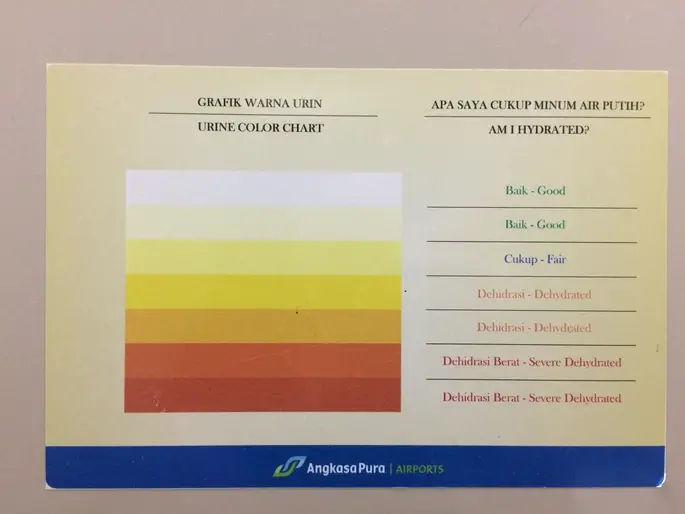
A urine color chart to determine whether or not you’re dehydrated, right above the toilet.
Even more water is needed for those experiencing diarrhea or vomiting. It’s a good idea to bring some rehydration salts with you to take every couple of days, and preempt any dehydration symptoms.
Monitor yourself and if you’re feeling cranky, not feeling like yourself, or if you’re getting headaches, you might be dehydrated and not realizing how much fluid you’re losing by sweating! Force yourself to drink lots of (filtered, purified, or boiled) water and sports drinks!
24. Get the required vaccinations and medications before leaving home
Before going to Indonesia, the CDC recommends being up to date on routine vaccinations including measles-mumps-rubella, diphtheria-tetanus-pertussis, varicella (chickenpox), and polio.
Additionally, the CDC recommends typhoid and hepatitis A vaccinations to most travelers to Indonesia.
Finally, there is a CDC list of vaccines and medications recommended to travelers depending on which part of Indonesia you’ll be traveling to. It’s a good idea to do research on the specific area you’re traveling to and talk to a doctor first. These include: hepatitis B, rabies, Japanese encephalitis, and malaria.
Err on the side of caution and get the vaccinations. The peace of mind is worth it.
25. Get travel insurance!
On that note of “peace of mind” – travel insurance! Don’t leave home without it. Do a search of travel insurance providers and choose one that covers the types of activities you plan on doing (Scuba diving? Snorkeling?) as well as theft.
We hope this list helps you in your preparations to visit Indonesia, one the greatest countries on Earth to visit, filled with some of the friendliest and most welcoming people! Enjoy your stay!
